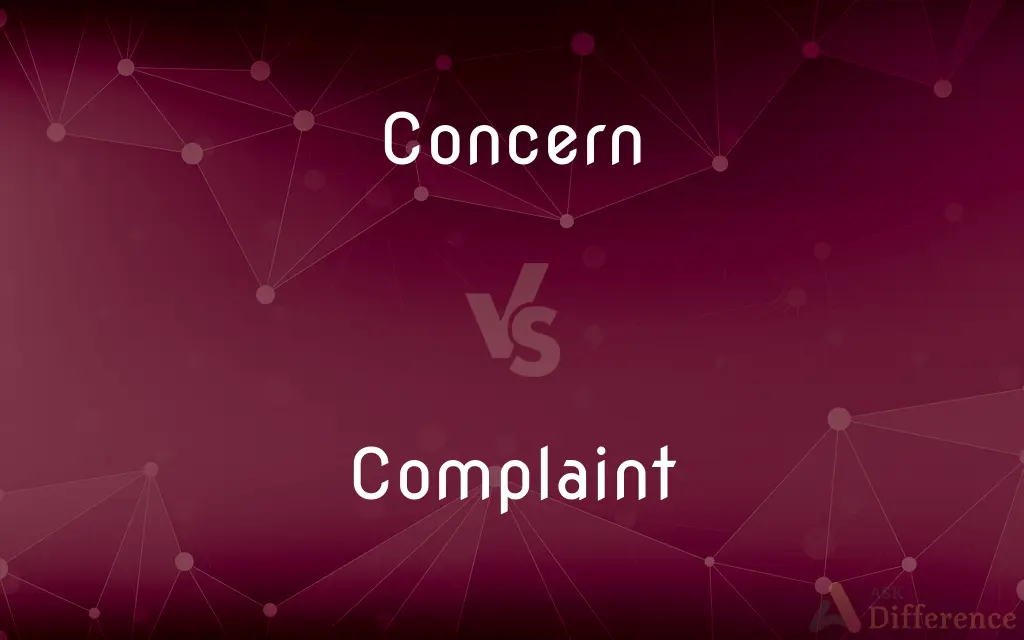Concern vs. Complaint — What's the Difference?
By Urooj Arif & Fiza Rafique — Updated on March 25, 2024
A concern refers to worry or unease about a potential issue, while a complaint is a formal expression of dissatisfaction with a specific problem.

Difference Between Concern and Complaint
Table of Contents
ADVERTISEMENT
Key Differences
Concerns are often more general, expressing worry, anxiety, or interest in a situation or potential issue without necessarily implying a fault or problem that needs immediate correction. On the other hand, complaints are explicit expressions of dissatisfaction or grievance about services, products, or behaviors, usually directed towards an entity responsible for addressing the issue.
A concern might be raised in a more informal or preventive context, aiming to address an issue before it escalates. Whereas a complaint is typically formal, requiring a response or action from the receiving party, and often follows established procedures for resolution.
Concerns often stem from a sense of care, responsibility, or precaution, focusing on potential risks or the need for clarification. Complaints, on the other hand, arise from experiences of inconvenience, poor service, or unmet expectations, demanding specific remedies or changes.
In a workplace or customer service context, concerns are usually voiced to highlight areas for improvement or attention without directly accusing or pointing out faults. Complaints, however, are more likely to be lodged when a problem is directly experienced, and the individual seeks redress or correction.
The response to a concern might involve reassurance, further information, or preventive measures, while addressing a complaint typically requires direct action, an apology, or compensation, reflecting the more formal and urgent nature of complaints compared to concerns.
ADVERTISEMENT
Comparison Chart
Definition
Worry or unease about a potential issue
Formal expression of dissatisfaction
Nature
General, potentially preventive
Specific, requiring redress
Formality
Can be informal
Usually formal and follows specific procedures
Origin
From care, responsibility, or precaution
From experienced inconvenience or unmet expectations
Aim
To address an issue before it escalates
To seek remedy or change for a specific problem
Response Required
May involve reassurance or preventive measures
Requires direct action or resolution
Tone
Can be exploratory or questioning
Often assertive or demanding
Examples
Expressing worry about safety measures
Filing a report on a faulty product
Compare with Definitions
Concern
A feeling of worry about a potential issue.
Her concern about the project's timeline led to an early review meeting.
Complaint
A demand for action or redress.
He lodged a complaint demanding a refund for the defective gadget.
Concern
A preventive consideration aimed at avoiding future problems.
The manager raised a concern about potential budget overruns.
Complaint
A grievance about a service or product.
She wrote a complaint regarding the poor quality of the meal.
Concern
An expression of interest or care regarding a situation.
He voiced his concern for the team's wellbeing during the tough phase.
Complaint
A formal statement expressing dissatisfaction.
The customer submitted a complaint about the late delivery.
Concern
A feeling that prompts one to address something that might not yet be a problem.
Their concern over the software's security features prompted an early upgrade.
Complaint
An official report of unsatisfactory conditions or events.
Residents filed a complaint against the noisy construction work.
Concern
A query raising awareness about a matter needing attention.
Parents shared their concerns regarding the new school policy.
Complaint
An expression of discontent aimed at initiating change.
The petition included complaints about the company's environmental policies.
Concern
Relate to; be about
The report is mainly concerned with 1984 onwards
The story concerns a friend of mine
Complaint
In legal terminology, a complaint is any formal legal document that sets out the facts and legal reasons (see: cause of action) that the filing party or parties (the plaintiff(s)) believes are sufficient to support a claim against the party or parties against whom the claim is brought (the defendant(s)) that entitles the plaintiff(s) to a remedy (either money damages or injunctive relief). For example, the Federal Rules of Civil Procedure (FRCP) that govern civil litigation in United States courts provide that a civil action is commenced with the filing or service of a pleading called a complaint.
Concern
Make (someone) anxious or worried
Don't concern yourself, old boy—my lips are sealed
The roof of the barn concerns me because eventually it will fall in
Complaint
An expression of pain, dissatisfaction, or resentment.
Concern
Anxiety; worry
Carole gazed at her with concern
Complaint
A cause or reason for complaining; a grievance
What is your complaint?.
Concern
A matter of interest or importance to someone
Housing is the concern of the Housing Executive
The prospect should be of concern to us all
Complaint
A bodily disorder or disease; a malady or ailment.
Concern
A business
The town's only travel agent was a small, debt-ridden concern
Complaint
The symptom or distress about which a patient seeks medical assistance.
Concern
A complicated or awkward object.
Complaint
A formal statement initiating a lawsuit by specifying the facts and legal grounds for the relief sought.
Concern
To have to do with or relate to
An article that concerns the plight of homeless people.
Complaint
A formal charge, made under oath, of the commission of a crime or other such offense.
Concern
To be of interest or importance to
This problem concerns all of us.
Complaint
The act of complaining.
Concern
To engage the attention of; involve
We concerned ourselves with accomplishing the task at hand.
Complaint
A grievance, problem, difficulty, or concern.
I have no complaints about the quality of his work, but I don't enjoy his company.
Concern
To cause anxiety or uneasiness in
The firm's weak financial posture is starting to concern its stockholders.
Complaint
(legal) In a civil action, the first pleading of the plaintiff setting out the facts on which the claim is based;
The purpose is to give notice to the adversary of the nature and basis of the claim asserted.
The purpose is to give notice to the adversary of the nature and basis of the claim asserted.
Concern
To be of importance.
Complaint
(legal) In criminal law, the preliminary charge or accusation made by one person against another to the appropriate court or officer, usually a magistrate.
However, court proceedings, such as a trial, cannot be instituted until an indictment or information has been handed down against the defendant.
However, court proceedings, such as a trial, cannot be instituted until an indictment or information has been handed down against the defendant.
Concern
A matter that relates to or affects one
What I do is not your concern.
Complaint
A bodily disorder or disease; the symptom of such a disorder.
Don't come too close; I've got this nasty complaint.
Concern
Regard for or interest in someone or something
His concern for you is genuine.
Complaint
Expression of grief, regret, pain, censure, or resentment; lamentation; murmuring; accusation; fault-finding.
I poured out my complaint before him.
Grievous complaints of you.
Concern
A troubled or anxious state of mind
A frown that expressed great concern.
Complaint
Cause or subject of complaint or murmuring.
The poverty of the clergy in England hath been the complaint of all who wish well to the church.
Concern
A business establishment or enterprise; a firm.
Complaint
An ailment or disease of the body.
One in a complaint of his bowels.
Concern
That which affects one’s welfare or happiness. A matter of interest to someone.
Mark’s health was of great concern to Connie.
Complaint
A formal allegation or charge against a party made or presented to the appropriate court or officer, as for a wrong done or a crime committed (in the latter case, generally under oath); an information; accusation; the initial bill in proceedings in equity.
Concern
The placement of interest or worry on a subject.
Most people in Australia have no concern for the recent events in London.
Complaint
An often persistent bodily disorder or disease; a cause for complaining
Concern
A worry; a sense that something may be wrong; an identification of a possible problem.
Let me know if you have any questions or concerns about the document.
Complaint
(formerly) a loud cry (or repeated cries) of pain or rage or sorrow
Concern
The expression of solicitude, anxiety, or compassion toward a thing or person.
Judy's eyes filled with concern as she listened to the news report.
Complaint
An expression of grievance or resentment
Concern
A business, firm or enterprise; a company.
The employees’ attitude is really hurting the concern.
A going concern
Complaint
(civil law) the first pleading of the plaintiff setting out the facts on which the claim for relief is based
Concern
(programming) Any set of information that affects the code of a computer program.
Complaint
(criminal law) a pleading describing some wrong or offense;
He was arrested on a charge of larceny
Concern
(transitive) To relate or belong to; to have reference to or connection with; to affect the interest of; to be of importance to.
Concern
(transitive) To engage by feeling or sentiment; to interest.
A good prince concerns himself in the happiness of his subjects.
Concern
(transitive) To make somebody worried.
I’m concerned that she’s becoming an alcoholic.
Concern
To relate or belong to; to have reference to or connection with; to affect the interest of; to be of importance to.
Preaching the kingdom of God, and teaching those things which concern the Lord Jesus Christ.
Our wars with France have affected us in our most tender interests, and concerned us more than those with any other nation.
It much concerns a preacher first to learnThe genius of his audience and their turn.
Ignorant, so far as the usual instruction is concerned.
Concern
To engage by feeling or sentiment; to interest; as, a good prince concerns himself in the happiness of his subjects.
They think themselves out the reach of Providence, and no longer concerned to solicit his favor.
Concern
To be of importance.
Which to deny concerns more than avails.
Concern
That which relates or belongs to one; business; affair.
The private concerns of fanilies.
Concern
That which affects the welfare or happiness; interest; moment.
Mysterious secrets of a high concern.
Concern
Interest in, or care for, any person or thing; regard; solicitude; anxiety.
O Marcia, let me hope thy kind concernsAnd gentle wishes follow me to battle.
Concern
Persons connected in business; a firm and its business; as, a banking concern.
Concern
Something that interests you because it is important or affects you;
The safety of the ship is the captain's concern
Concern
An anxious feeling;
Care had aged him
They hushed it up out of fear of public reaction
Concern
A commercial or industrial enterprise and the people who constitute it;
He bought his brother's business
A small mom-and-pop business
A racially integrated business concern
Concern
Something or someone that causes anxiety; a source of unhappiness;
New York traffic is a constant concern
It's a major worry
Concern
A feeling of sympathy for someone or something;
She felt strong concern for those less fortunate
Concern
Have to do with or be relevant to;
There were lots of questions referring to her talk
My remark pertained to your earlier comments
Concern
Be on the mind of;
I worry about the second Germanic consonant
Common Curiosities
How should businesses handle concerns differently from complaints?
Concerns should be addressed proactively to prevent escalation, while complaints require formal investigation and resolution.
Is it necessary to document concerns like complaints?
Documenting concerns can be helpful for tracking potential issues, but formal documentation is more critical for complaints.
Why is it important to voice concerns early?
Voicing concerns early can prevent issues from becoming more significant problems, potentially avoiding the need for formal complaints.
Can a complaint be resolved without formal action?
While some complaints may be resolved through discussion or clarification, formal action is often needed to adequately address the grievance.
Can a concern turn into a complaint?
Yes, if a concern is not adequately addressed, it may escalate into a formal complaint.
Can concerns be anonymous?
Concerns can often be raised anonymously, especially in contexts where individuals may fear repercussions.
Do all complaints result in change?
Not all complaints result in the desired change, depending on the nature of the complaint and the response of the entity it's directed towards.
Are complaints always negative?
While complaints highlight dissatisfaction, they provide valuable feedback for improvement and can lead to positive changes.
What is the role of customer service in managing concerns and complaints?
Customer service plays a crucial role in addressing both concerns and complaints, aiming to reassure and resolve issues to maintain trust and satisfaction.
How should one communicate concerns or complaints effectively?
Clearly, respectfully, and constructively, providing all relevant information to facilitate understanding and resolution.
How can one differentiate between a concern and a complaint?
A concern expresses worry or unease, often in a more informal or preventative manner, while a complaint is a formal expression of dissatisfaction requiring resolution.
How do legal systems differentiate between concerns and complaints?
Legal systems typically regard complaints as formal grievances requiring adjudication, while concerns may inform less formal dispute resolution processes.
Is there a limit to what can be considered a complaint?
Complaints usually have to meet certain criteria, such as being specific and actionable, to be formally recognized and addressed.
Can one have a concern without a specific solution in mind?
Yes, concerns can be raised simply to highlight an area of worry or interest without necessarily knowing how to address it.
What impact do unresolved complaints have on a business?
Unresolved complaints can lead to customer dissatisfaction, loss of trust, and negative public perception, impacting the business's success.
Share Your Discovery

Previous Comparison
Coercivity vs. Retentivity
Next Comparison
Iodometry vs. IodimetryAuthor Spotlight
Written by
Urooj ArifUrooj is a skilled content writer at Ask Difference, known for her exceptional ability to simplify complex topics into engaging and informative content. With a passion for research and a flair for clear, concise writing, she consistently delivers articles that resonate with our diverse audience.
Co-written by
Fiza RafiqueFiza Rafique is a skilled content writer at AskDifference.com, where she meticulously refines and enhances written pieces. Drawing from her vast editorial expertise, Fiza ensures clarity, accuracy, and precision in every article. Passionate about language, she continually seeks to elevate the quality of content for readers worldwide.
















































